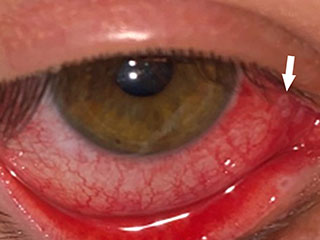What’s Scary About Costume Contact Lenses?
- On September 19, 2022
- costume contact lenses

Danger: Colored Contacts Can Harm Your Eyes
Wearing colored contact lenses without a prescription may seem harmless, but beware: Costume contacts can severely damage your eyes and even cause permanent blindness if they’re not fitted by an eye specialist. And many costume contact lenses are sold without a doctor’s prescription, which is illegal in the United States.
If you’re wearing costume contacts for cosplay, Halloween or other events, here’s how to do it without damaging your eyes.
“Consumers need to know that permanent eye damage can occur from using non-prescription lenses,” says Thomas Steinemann, MD, a practicing ophthalmologist at MetroHealth Medical Center in Cleveland, Ohio. “Personally, I have seen far too many serious cases in both children and adults from using decorative lenses.”
Video: Halloween contact lenses can be scary – for your eye health
Colored contacts (also called cosplay contacts or costume contacts)
Costume contact lenses – also known as cosmetic or decorative contact lenses – are contact lenses that change how your eyes look. These contact lenses can make your eyes look different in many ways, from changing the eye’s color or pupil shape to giving cartoon or film character effects. They can be made with or without vision correction.
Over-the-counter contact lenses are harmful – except if …
Costume contacts can be worn safely if you see a doctor first and follow their advice. Remember that contact lenses are medical devices that require a commitment to proper wear and care by the wearer. If not used correctly, all contact lenses can increase your chance of an eye infection.
The best way to ensure safety when using contact lenses is to see an eye care professional first. An ophthalmologist can measure your eyes for properly fit contacts, assess whether or not you are a good candidate for contacts, and offer safety tips.
After you have been to an ophthalmologist and received a prescription, be sure to only buy costume contacts from retailers who require a prescription to purchase the lenses and who only sell FDA-approved contact lenses.
Is it safe to wear non-prescription colored contacts?
Packaging that claims ‘one size fits all’ or ‘no need to see an eye doctor’ is wrong. Non-prescription costume contacts can cut, scratch and infect your eye if they don’t fit exactly right. They should be customized and tailored to each individual.
Improperly sized lenses can cause corneal abrasions, corneal ulcers and potentially blinding painful bacterial infections like keratitis. Costume, cosplay or theatrical contact lenses also might let less oxygen through to the eye, because the paints and pigments used to add color make the lenses thicker and less breathable.
Treating these injuries can require eye surgery, like a corneal transplant. And treatment doesn’t always work. People have been blinded by costume contact lenses.
Costume contacts cause eye injuries every year
There are no comprehensive studies of how many injuries costume contact lenses cause. However, we hear anecdotally from ophthalmologists that they see contact-related injuries each year despite FDA regulations.
A study of more than 600 women living in Texas found that 1 in 4 had used non-prescription contacts, most of them obtained from unauthorized sources such as costume shops, salons or novelty stores. About 60% of the wearers reported eye problems such as pain, itchiness, redness and swelling. The rate of eye injuries rose to 88% among wearers who had borrowed someone else’s lenses. Many of those with eye injuries delayed seeking medical treatment, which further put their vision at risk.
A 2017 survey of eye care professionals found that young people aged 18 to 25 are at highest risk of eye injuries from costume contacts. One-third of the injuries treated by those eye care professionals occurred in first-time lens wearers, few of whom had received safety instructions.
Eye infections are among the most common injuries from these lenses. Harmful bacteria are found in about 60% of costume contacts purchased online without a prescription, according to the FDA’s analysis of 300 counterfeit lenses. A 2018 study found over 85% of people wearing contacts had at least one non-hygienic behavior putting them at risk for a serious contact lens–related eye infection.
Why can I buy colored contacts without a prescription if they’re not safe?
These retailers are breaking the law. In the U.S., it has been illegal to sell contact lenses without a prescription since 2005. Federal law classifies all contact lenses as medical devices and restricts their distribution to licensed eye care professionals. Illegal sale of contact lenses can result in civil penalties of up to $16,000 per violation. If you see contact lenses being sold by retailers not requiring a prescription, you can report the retailer to the FDA.
Illegally sold circle lenses bypass several crucial safeguards, such as a lens fitting and instructions about wear and care that are specific to you, your eyes and the contacts you are prescribed. Dr. Steinemann also warns that counterfeit lenses are common if you’re buying through an illegal outlet. Some illegal lenses have even been found to be re-packaged and can be contaminated with chemicals or germs when you receive them.
If you’re buying lenses that haven’t been FDA-approved or you’re buying through a dealer who isn’t regulated by the FDA, you can’t be sure what you’re receiving. The lenses you get may not be what you ordered, they may not be clean or correctly packaged and they may not be the right size or shape for your eye to begin with. The risks aren’t worth it.
Safely wear costume contact lenses with these tips:
-
Get an eye exam from a licensed eye care professional such as an ophthalmologist — an eye medical doctor — who will measure each eye and talk to you about proper contact lens care.
-
Obtain a valid prescription that includes the brand name, lens measurements and expiration date.
-
Purchase the colored contact lenses from a retailer who asks for a prescription.
-
Follow the contact lens care directions for cleaning, disinfecting and wearing the lenses.
-
Never share contact lenses with another person.
-
Get follow-up exams as directed with your eye care provider.
If you notice redness, swelling, excessive discharge, pain or discomfort from wearing contact lenses, remove the lenses and seek immediate medical attention from an ophthalmologist. Eye infections can become serious very quickly and sometimes the damage is not reversible.

